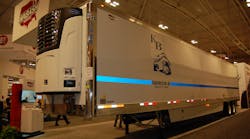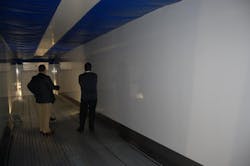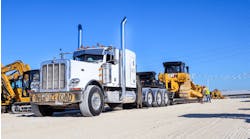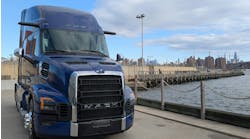NASHVILLE. An all-composite refrigerated trailer introduced last year by Wabash National Corporation at the 2016 Technology & Maintenance Council (TMC) meeting as a prototype is now in a “limited production run” of 100 units over the next 18 months, Brent Yeagy, Wabash’s president and COO, told Fleet Owner here at the 2017 TMC annual meeting.
“Last year it was a concept; today it is truly ready for the road,” he said. “The one seen here on display in our booth is going to be out on the road in a few weeks with K&B Transportation.”
Wabash’s cold chain series refrigerated van trailer is made with its proprietary molded structural composite with thermal technology (MSCT), which Yeagy said improves the trailer’s thermal performance by up to 25%, lightens it by 20%, all while improving puncture and damage resistance.
In addition, the molded structural composite floor provides higher floor weight ratings of up to 24,000 lbs. to improve the unit’s backhaul capability so it can a more productive asset for reefer fleets.
Brock Ackerman, owner of K&B Transportation one of four “launch fleets” for the new trailer, told Fleet Owner that a key feature of this new design for food haulers like him is its smooth interior wall.
“That smooth wall means there are few areas where bacteria can get into and ‘hide’ within the trailer,” he explained. “With the new FDA [Food and Drug Administration] food safety rules coming out, that’s a big plus.”
To support production of its new MSCT units, Yeagy highlighted the $3 million investment Wabash made in early February at a manufacturing facility it recently acquired in Little Falls, MN; as part of a $10 million longer-term plan to expand production operations for molded structural composites (MSC) for both trailers and truck bodies.
Wabash said earlier that it selected the Little Falls location as the launch facility for its composite production efforts because of the “unique combination” of its experienced and skilled workforce in composite manufacturing processes, along with a fully equipped and highly engineered facility capable of producing large-size parts at high rates of volume. The company officially takes ownership of the plant in April.
“Our expanding portfolio of composite offerings is instrumental to that goal,” Yeagy explained. “The expansion of our MSC manufacturing capabilities, as well as our new licensed ThermHex honeycomb core composite technology that we announced last year, highlight this growing competency in advanced composites.”




